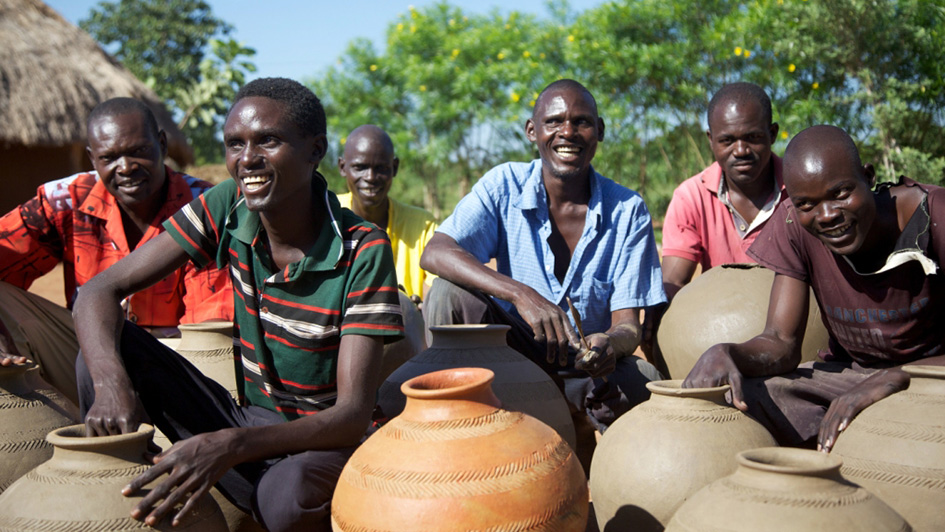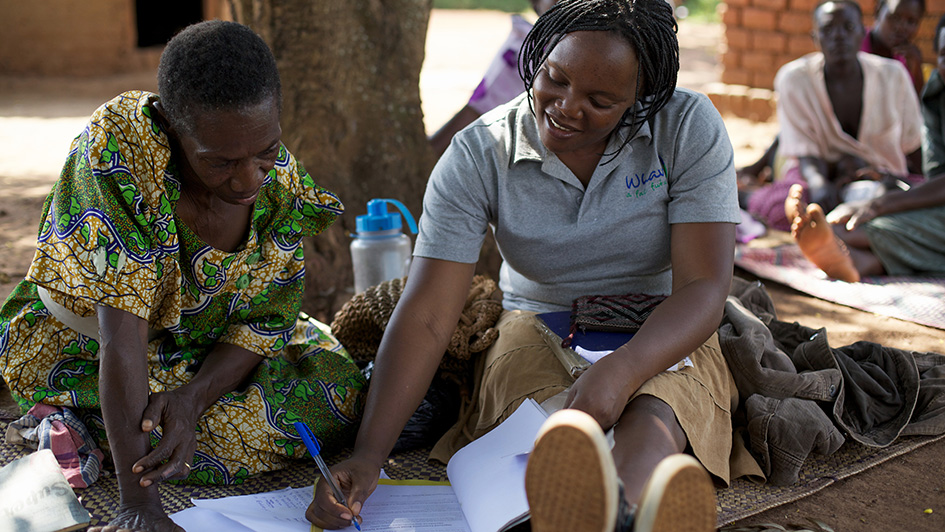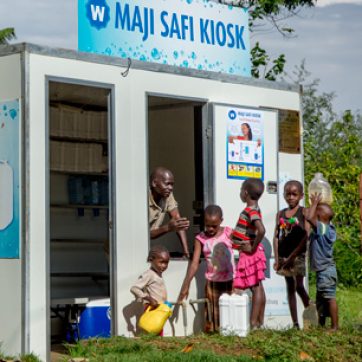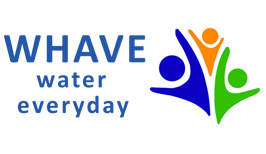Maji Health
Preventing recontamination of clean drinking water

For many years, we have been strengthening the development of sustainable structures in East Africa that ensure access to clean drinking water and hygiene services in underserved communities. Time and again, however, we have witnessed that clean drinking water is recontaminated due to various factors. Studies also show how important the last stage of water consumption is. Therefore, together with our partner Whave Solutions in Uganda, we are testing a series of innovative measures that incorporate local traditions and indigenous knowledge to prevent recontamination of drinking water and to promote health and hygiene.
Project
Executing innovative solutions to counter the water-related health crisis
Our long standing partner Whave Solutions in Uganda is implementing various measures to prevent diseases caused by impure water distribution. They are tackling the problem of recontamination directly at user end. The aim is to implement the most effective solutions in communities and other locations on a long-term and sustainable basis.
Entrepreneurial approach as the basis for sustainability
It is crucial for us to build business models that work sustainably. Therefore, Whave relies on local production through the empowerment of local entrepreneurs by encouraging franchise concepts and cooperative collaboration with the communities in all its approaches.
Evaluation and publication of the findings for the WASH sector
The findings of the Maji Health project will be published for representatives from local governments, international donor organizations and NGOs. The focus will be on a comparative cost-benefit analysis and the general feasibility of the respective solutions.

The activities at a glance
Recontamination often occurs when bacteria gets into the water due human touch. To tackle this specific problem, Whave has worked with local potters to develop clay water containers with a tap. This means that water can be safely poured into a cup or mug at home without the risk of it being contaminated again by hands. Potters are to be trained in two regions in Uganda in order to achieve a long-term impact. Locally produced ladles also help to prevent contact between hands and water in containers without a tap.
Washing hands is one of the most effective measures against drinking water contamination. Therefore, Whave distributes locally produced hand washing stations from Happihands. The stations are well bulit, have an attractive design are easy to use. Users are able to make affordable purchase process via Mobile Money. The stations are mainly sold to stores, schools and events.
The common cause of drinking water contamination is due to faecal bacteria such as E. coli. Whave is also tackling this specific problem and reviving indigenous methods. Whave sells seedlings of a plant whose leaves are used as toilet paper. This creates sustainable and cost-effective access to hygiene to minimize contamination, particularly with E. coli bacteria, and to build on proven local methods.
Chlorinating water is a proven method for the long-term treatment of drinking water. Whave produces its own chlorine dispensers for this purpose, which can be installed near water points. The dispensers are established via Whave’s large network of around 1,100 community members in Uganda.
In addition to the other innovative solutions, Whave is developing and planning a nationwide awareness campaign in Uganda on the topic of “Always wash your hands when you enter the house”. To this end, a best practice concept is being developed that includes social marketing on TV and radio along with comedy and jingles.
Closely linked to the hygiene campaign, Whave will develop new flyers and posters to make hygiene in everyday life attractive and to promote it. The information material provided by the health officers in the respective communities is very often old and advertises products that the target group cannot afford. In most cases they are not useful in rural areas (e.g. toilet paper packaged in plastic). To this end, Whave designs its own material to bring neglected traditional hygiene solutions back into the spotlight.
Not only does the education campaign aim to bring about behavioral change, but Whave also wants to document the change through an integrated monitoring protocol (e.g. on the use of chlorine dispensers and hand-washing stations). The theory behind this is based on the assumption that by regularly monitoring the progress of the project itself, the people involved become aware of their own responsibility for hygiene. The protocol used for this has been tested by Whave over a period of four years and has already brought about a positive change in hygiene behavior.
The health kits designed by Whave contain sanitary towels, hand-washing stations and ceramic filters. These are marketed as part of a franchise model by local companies, health officers or Whave employees. The aim of this approach is to generate additional income. The focus here is on investigating the extent to which hygiene measures (water samples & monitoring protocols) can be financed by this additional income.
The continuous measurement of water quality provides the basis for drawing conclusions from the above-mentioned measures and evaluating the changes achieved. Water quality is measured in conjunction with socio-demographic and cultural information. On this basis, it will be evaluated in the course of the project the hygiene measures are effective and the ones that need to be terminated early to use resources in a targeted manner. In addition, this data serves as a basis for larger-scale national projects.
During World Water Week 2024, our partner organisation Whave provided insights into its work.
Contact us
Are you interested to learn about the findings of the project?
Get in touch with us now!
Project manager Maji Health
Christine Meinhardt
christine.meinhardt@siemens-stiftung.org
Topic-page-water-header

Social entrepreneurial and self-reliant solutions for drinking water and hygiene
With our programs, we are helping to bring about change in the drinking water supply and hygiene conditions in East Africa. Learn more about our expertise and best practices in this area.
You might also be interested in
Sources
- Gärtner, N., Germann, L., Wanyama, K., Ouma, H., & Meierhofer, R. (2021). Keeping water from kiosks clean: Strategies for reducing recontamination during transport and storage in Eastern Uganda
- Wright, J., Gundry, S., & Conroy, R. (2004). Household drinking water in developing countries: A systematic review of microbiological contamination between source and point-of-use



